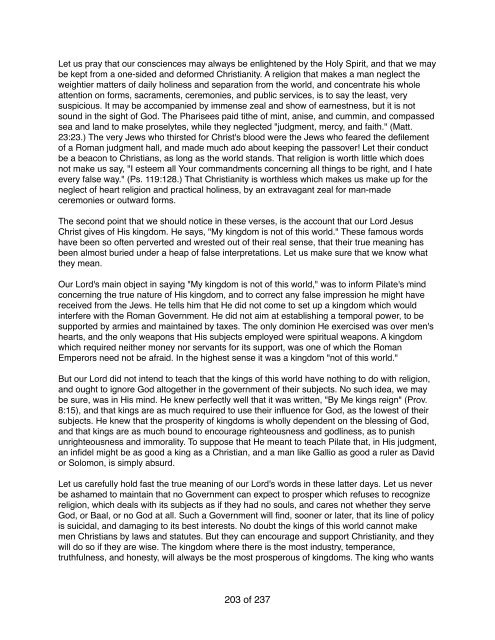J. C. Ryle John
John Charles Ryle (May 10, 1816 - June 10, 1900) was an evangelical Anglican clergyman and first Bishop of Liverpool. He was renowned for his powerful preaching and extensive tracts.
John Charles Ryle (May 10, 1816 - June 10, 1900) was an evangelical Anglican clergyman and first Bishop of Liverpool. He was renowned for his powerful preaching and extensive tracts.
You also want an ePaper? Increase the reach of your titles
YUMPU automatically turns print PDFs into web optimized ePapers that Google loves.
Let us pray that our consciences may always be enlightened by the Holy Spirit, and that we may<br />
be kept from a one-sided and deformed Christianity. A religion that makes a man neglect the<br />
weightier matters of daily holiness and separation from the world, and concentrate his whole<br />
attention on forms, sacraments, ceremonies, and public services, is to say the least, very<br />
suspicious. It may be accompanied by immense zeal and show of earnestness, but it is not<br />
sound in the sight of God. The Pharisees paid tithe of mint, anise, and cummin, and compassed<br />
sea and land to make proselytes, while they neglected "judgment, mercy, and faith." (Matt.<br />
23:23.) The very Jews who thirsted for Christ's blood were the Jews who feared the defilement<br />
of a Roman judgment hall, and made much ado about keeping the passover! Let their conduct<br />
be a beacon to Christians, as long as the world stands. That religion is worth little which does<br />
not make us say, "I esteem all Your commandments concerning all things to be right, and I hate<br />
every false way." (Ps. 119:128.) That Christianity is worthless which makes us make up for the<br />
neglect of heart religion and practical holiness, by an extravagant zeal for man-made<br />
ceremonies or outward forms.<br />
The second point that we should notice in these verses, is the account that our Lord Jesus<br />
Christ gives of His kingdom. He says, "My kingdom is not of this world." These famous words<br />
have been so often perverted and wrested out of their real sense, that their true meaning has<br />
been almost buried under a heap of false interpretations. Let us make sure that we know what<br />
they mean.<br />
Our Lord's main object in saying "My kingdom is not of this world," was to inform Pilate's mind<br />
concerning the true nature of His kingdom, and to correct any false impression he might have<br />
received from the Jews. He tells him that He did not come to set up a kingdom which would<br />
interfere with the Roman Government. He did not aim at establishing a temporal power, to be<br />
supported by armies and maintained by taxes. The only dominion He exercised was over men's<br />
hearts, and the only weapons that His subjects employed were spiritual weapons. A kingdom<br />
which required neither money nor servants for its support, was one of which the Roman<br />
Emperors need not be afraid. In the highest sense it was a kingdom "not of this world."<br />
But our Lord did not intend to teach that the kings of this world have nothing to do with religion,<br />
and ought to ignore God altogether in the government of their subjects. No such idea, we may<br />
be sure, was in His mind. He knew perfectly well that it was written, "By Me kings reign" (Prov.<br />
8:15), and that kings are as much required to use their influence for God, as the lowest of their<br />
subjects. He knew that the prosperity of kingdoms is wholly dependent on the blessing of God,<br />
and that kings are as much bound to encourage righteousness and godliness, as to punish<br />
unrighteousness and immorality. To suppose that He meant to teach Pilate that, in His judgment,<br />
an infidel might be as good a king as a Christian, and a man like Gallio as good a ruler as David<br />
or Solomon, is simply absurd.<br />
Let us carefully hold fast the true meaning of our Lord's words in these latter days. Let us never<br />
be ashamed to maintain that no Government can expect to prosper which refuses to recognize<br />
religion, which deals with its subjects as if they had no souls, and cares not whether they serve<br />
God, or Baal, or no God at all. Such a Government will find, sooner or later, that its line of policy<br />
is suicidal, and damaging to its best interests. No doubt the kings of this world cannot make<br />
men Christians by laws and statutes. But they can encourage and support Christianity, and they<br />
will do so if they are wise. The kingdom where there is the most industry, temperance,<br />
truthfulness, and honesty, will always be the most prosperous of kingdoms. The king who wants<br />
203 of 237




